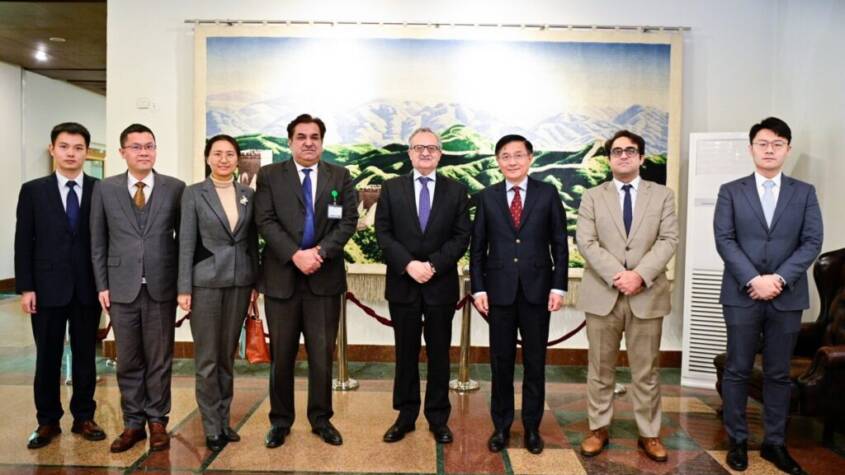China, Pakistan discuss situation in Afghanistan, regional collaboration

Following China’s formal acceptance of the Taliban-appointed Ambassador of Afghanistan, Bilal Karimi, Pakistan received a briefing from Chinese Special Envoy on Afghanistan, Ambassador Yue Xiaonyoung. The move by China to accept credentials from a Taliban representative is viewed as a “tacit recognition” of the Afghan Taliban government.
Key Points:
- Chinese Special Envoy’s Visit: Ambassador Yue Xiaonyoung, a close aide of Chinese President Xi Jinping, visited Islamabad to hold discussions with Pakistani authorities, including Foreign Secretary Cyrus Qazi and Additional Foreign Secretary for Afghanistan and West Asia, Ambassador Rahim Hayat Qureshi.
- Commitment to Peace in Afghanistan: The official statement issued by the Foreign Office highlighted both sides’ commitment to a peaceful and stable Afghanistan. The need for enhanced coordination for regional stability was emphasized, with an acknowledgment of the crucial role of neighboring countries in achieving peace, stability, and prosperity in the region.
- China-Pakistan Coordination: While specific details of the discussions were not provided, it is understood that China briefed Pakistan on its decision to accept a full-time Taliban ambassador. China is believed to have taken Pakistan into confidence about this move.
- Solo Flight Concerns: Diplomatic sources suggest that China’s move may be viewed as a departure from the regional understanding that decisions related to the recognition of the Taliban government should be taken collectively and with consensus among neighboring countries.
- Leverage and Long-term Interests: Despite potential concerns, China’s engagement with the Taliban government could offer increased leverage and strategic advantages, aligning with China’s long-term interests in the region. China has consistently expressed concerns about terrorist outfits, such as the East Turkestan Islamic Movement (ETIM), operating from Afghan soil.
- International Benchmarks: The international community has set benchmarks for recognizing the Taliban, including the formation of an inclusive government, allowing girls’ education, permitting women to work, and preventing Afghan soil from being used by terrorist groups. China’s move appears to be driven by pragmatic considerations of its strategic interests.
- US Consulate Reopening: In a related development, the United States is cautiously exploring the possibility of reopening its consulate in Kabul. The move is part of the new strategy approved by the State Department. However, the US clarified that reopening the consulate does not imply recognition of the Taliban government.
China’s evolving engagement with the Taliban government raises questions about the broader regional dynamics and the implications for peace and stability in Afghanistan. The move aligns with China’s pursuit of strategic interests while managing concerns related to terrorism and regional stability.


